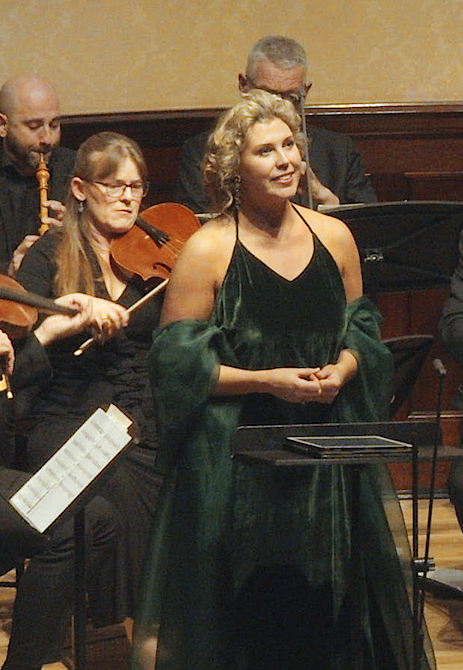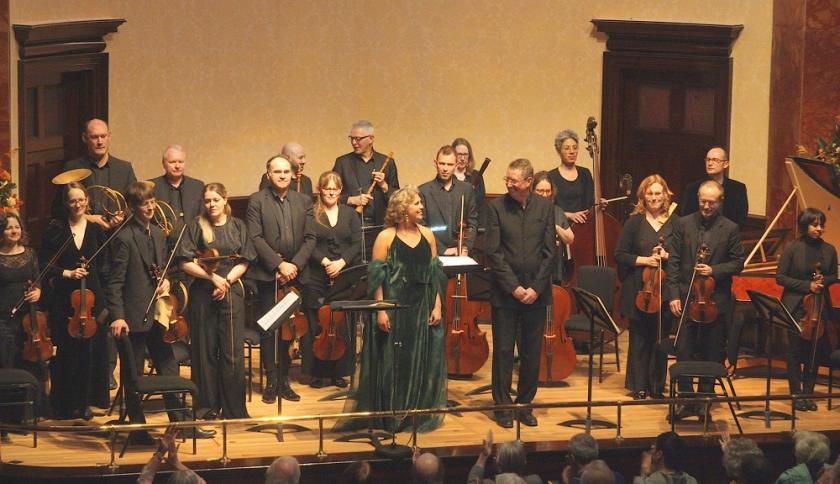Ian Page’s “journey of a lifetime” with his Mozartists, taking the greatest genius year by year, lands us in 1773 with the adolescent Mozart's first durable crowdpleaser, the pretty-brilliant motet for soprano and orchestra Exsultate, jubilate (last night was its 250th anniversary). The boy wonder still needs annual support from his elders, though, and as usual we got more than just a sampler of what else was going on musically in that year.
Page’s scholarly but performance-vivid planning gave us a first half which was a kind of Sturm und Drang sandwich – vivid, angular products of that style (though I use the definition more loosely than Page would) as the filling, Mozart and Haydn specimens of a more galant nature as the bread. By his and Mozart’s own admission he didn’t make things easy at first for his committed soprano Alexandra Lowe – newly graduated in style from the Royal Opera’s Jette Parker Young Artists Programme with a career-defining performance in Schoenberg’s Pierrot Lunaire, now an Associate Artist of The Mozartists.
Mozart wrote of Anton Schweitzer, whose plangent-stormy recitative and aria from a German setting of Alceste launched Lowe’s new association, that “he will never learn how to write singably”, and Page writes in his note that he sympathises. So it wasn’t just a question of German as opposed to Italian or French making the lines a bit rocky. But Lowe sang with intensity and expressiveness, secure in the chest voice to which Schweitzer sends his Alceste rather too often. Mysliveček’s Italian Magdalane in “Potea quel piato” from La Passione di Nostro Signore Gesu Cristo has an often smoother lament, but one with a fair bit of operatic dudgeon for an oratorio.
 Yet both these arias had interest, which you can’t really claim for the pretty platitudes Haydn supplies Sandrina in her last aria from L’infedeltà delusa. How is that the master who found interest and originality in so many of his symphonies and string quartets could have written such bland operas? Not even Lowe (pictured left) could hold the interest here. It was all the more marked in the contrast with Symphony No 51 after the interval – quirky to the point of absurdity in its Adagio. Haydn would not have written so challengingly for valveless horns – obsceney high for the first, comically low for the second – had he not been blessed with remarkable players at the Esterházy court in Eisenstadt. Last night, let’s just say, we needed a rescue job from a consummate soloist gifted on every type of horn like Alec Frank Gemmill. Yet none of the other original features in every movement passed without deft highlighting from Page, starting with the ricocheting second theme in the first movement.
Yet both these arias had interest, which you can’t really claim for the pretty platitudes Haydn supplies Sandrina in her last aria from L’infedeltà delusa. How is that the master who found interest and originality in so many of his symphonies and string quartets could have written such bland operas? Not even Lowe (pictured left) could hold the interest here. It was all the more marked in the contrast with Symphony No 51 after the interval – quirky to the point of absurdity in its Adagio. Haydn would not have written so challengingly for valveless horns – obsceney high for the first, comically low for the second – had he not been blessed with remarkable players at the Esterházy court in Eisenstadt. Last night, let’s just say, we needed a rescue job from a consummate soloist gifted on every type of horn like Alec Frank Gemmill. Yet none of the other original features in every movement passed without deft highlighting from Page, starting with the ricocheting second theme in the first movement.
17-year old Mozart in 1773 would have been challenged to rival that, but the comparable idea in his Symphony No. 27 had plenty of individual charm in this performance, and a lot of soft playing – especially from muted strings in the Andante grazioso – highlighted the sense of intimacy. Mozart’s youthful high spirits combine with ingenuity in an exceptionally lively Presto. The third symphony of the evening, running continuously, was the most radical, harmonically speaking, of the evening: C P E Bach’s B minor firework. With four-part strings backed only by harpsichord, the leadership of Matthew Truscott was especially strong here.
There was one more symphonic movement, the simple but soft and sweet Andante un poco Adagio from Abel’s Symphony in A major: the right way to end the concert, since the official ending turned out to be more sober than expected. Lowe’s lyric soprano has acquired surprising weight recently, which allows for the intensity on display in the first half, and sustained beauty of tone in the slow aria of Exsultate, jubilate. But that inevitably means the coloratura is no longer quite so agile. Sensibly, Page chose a more spacious than usual tempo for the “Alleluias”: fine, but having heard a true stylist for such runs, mezzo Tara Erraught, in the same work last summer, it has to be acknowledged that this was not Lowe’s ultimate comfort zone. Still, the abundance of riches and the promise of more from her with The Mozartists are enough to be thankful for.















Add comment